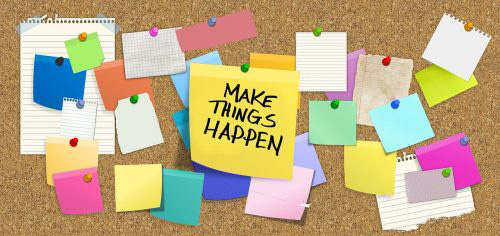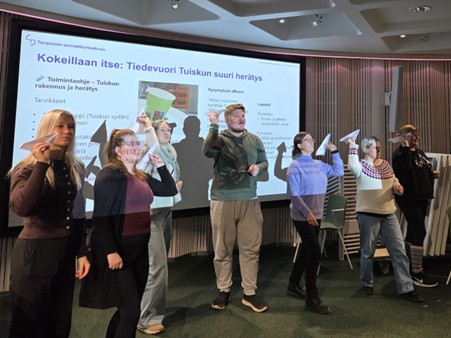Tampere University of Applied Sciences (TAMK), in collaboration with Tampere University and other stakeholders, has over the past year launched a great number of trials that will concretely show us the way to what continuous learning means. What are the models that work and help our community to make continuous learning a reality that brings eventually more opportunities and options to face tomorrow with?
Aamulehti dedicated last week its editorial to continuous learning and made a clear statement about the numerous challenges that we are, and we will growingly, be facing to up-skill and re-skill ourselves in the future. They encourage our university community to be in the forefront to find new solutions, act and change our mindset towards this new reality, that continuous learning brings along. For sure, changing our mindset is a long-term challenge and it will require still some time. But again, what can we do right now, right here to embrace the change other than get involved in bold trials!? We need to try and fail fast and forward to eventually meet the successes that will gradually strengthen this mindset continuous learning requires to make it a happy normality, our happy normality. Therefore today, I will focus on what we are already doing to face these challenges by introducing you to a very promising model that TAMK developed swiftly to answer rapidly, efficiently and realistically to the need exposed by the City of Tampere last spring.
One thing is sure. We have to do something.
We have to do the best we know how at the moment…
If it doesn´t turn out right, we can modify it as we go along.
Franklin D. Roosevelt
Up-skill or re-skill oneself when work keeps you already busy all day long is a very demanding project. And sometimes it just may feel impossible. Nevertheless, sometimes it just needs to happen. And sometimes faster than we could have anticipated, as we have all come to understand in the past weeks with the Covid-19 situation. Some other time, the change is requested by the law. What then? Then there isn´t much other options than to take upon the challenge and turn it into an opportunity! This is what is happening here, as according to the Early Childhood Education and Care (ECEC) Act, that came into force in the beginning of September 2018, by 2030, two thirds of the ECEC centers’ staff must have a Bachelor level qualification. The City of Tampere needs therefore to complete a major up-skill process for a major part of its daycare personnel, and it needs to happen already now. Obviously, the City needs their personnel in the daycares and cannot afford to have them away for many weeks or months from their workplaces. There, a clear shift was needed to be made to enable most of the learning processes to happen at work. But how to operate? How to guarantee the quality of teaching and learning? Novelty and disruption bring discomfort. The need to go beyond traditional models is inevitable and questions the status of universities as being the only legitimate capacity providers can be hard. For sure. We need to acknowledge it and work together to build new tools, new models that will keep on enabling capacity development and at the end of the day, that is all we need to focus on.
TAMK was then chosen to join a collaborative effort to provide a new type of training. From last spring onwards, our teachers started to plan this new learning path and organize the study content, so that it can be comprehended in another manner than in classrooms. The information session attracted more than a hundred potential candidates and we got as many applications to be part of the first student group. Eventually 30 daycare professionals got selected and have now been studying through the open studies path thanks to this new model that enables professionals to study at work. Our staff closely collaborated with daycare personnel and a series of workshops for teachers and students have been given to internalize the accustomed method of studying. In addition to the monthly contact teaching days, the pilot consists of a method of learning, that is, acquiring knowledge by working and combining practical work with the related knowledge base. This pilot has been put together rapidly to be able to react accordingly, following closely the needs expressed by the group involved. This new way of assuring skill development represents a model that can be replicated to some other fields. As Roosevelt´s quote stated: what we knew was the need for action and our collaborators realized this program with the best know-how they had then. Does it mean that it is perfect and ready to be indefinitely replicated? Probably not, but we can already say that we´ve received already very positive feedback. But we are working collaboratively, still learning along the way and of course committed to improve the models we work on, and that´s exactly what these development projects are for. I encourage you to visit our continuous learning webpage where you can find more information about the opportunities Tampere Universities already offering, right now right here, to develop your skills and have a look at the testimonial of Jaana who´s one the participant and read our Spring newsletter! In other words, stay tuned or do I dare to write TUNIed 😉.
Physics pioneer Newton stated about this natural relation between action and reaction and many of times that is how we function: something happens and forces us to find a solution and we focus on the reaction. But this brings along a great amount of pressure to act fast and efficiently. And this, not only in terms of finding the adequate solution but also in terms of use of resources. Therefore, not to become the slaves of rapid change, we aim at extracting ourselves from a reaction-oriented system of functioning and try to anticipate as much as possible tomorrow´s needs to be able to work on them before an action requires an inevitable reaction.
Next time, I will present you different initiatives that this project has enabled to support to cope with this need of anticipating for action instead of reaction.
Text: Clementine Arpiainen, Project Manager, Continuous Learning






Kommentit